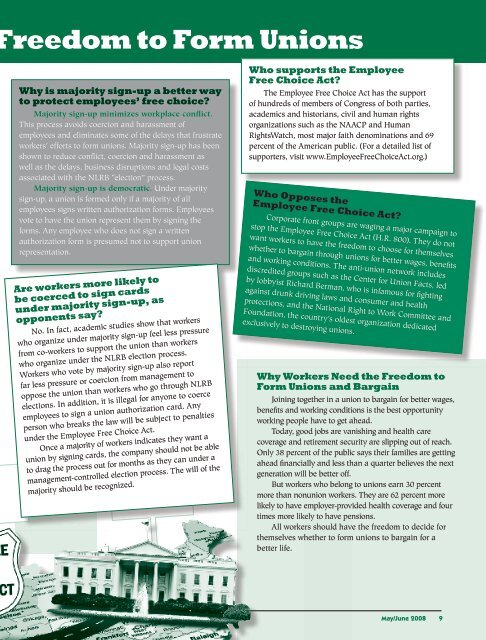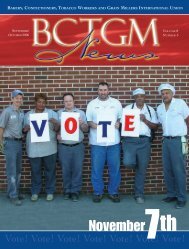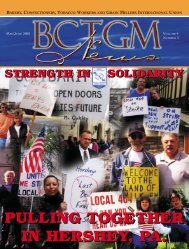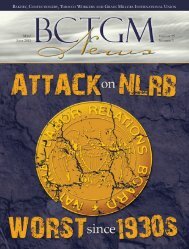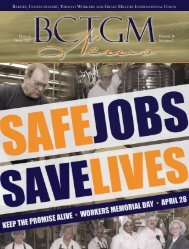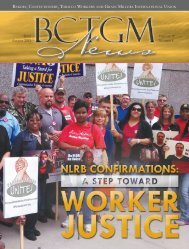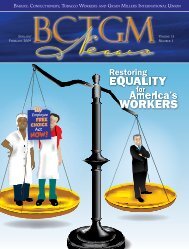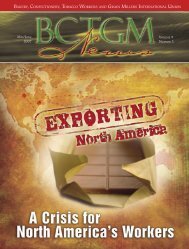to view/print. - Bakery, Confectionery, Tobacco Workers and Grain ...
to view/print. - Bakery, Confectionery, Tobacco Workers and Grain ...
to view/print. - Bakery, Confectionery, Tobacco Workers and Grain ...
You also want an ePaper? Increase the reach of your titles
YUMPU automatically turns print PDFs into web optimized ePapers that Google loves.
eedom <strong>to</strong> Form UnionsWhy is majority sign-up a better way<strong>to</strong> protect employees’ free choice?Majority sign-up minimizes workplace conflict.This process avoids coercion <strong>and</strong> harassment ofemployees <strong>and</strong> eliminates some of the delays that frustrateworkers’ efforts <strong>to</strong> form unions. Majority sign-up has beenshown <strong>to</strong> reduce conflict, coercion <strong>and</strong> harassment aswell as the delays, business disruptions <strong>and</strong> legal costsassociated with the NLRB “election” process.Majority sign-up is democratic. Under majoritysign-up, a union is formed only if a majority of allemployees signs written authorization forms. Employeesvote <strong>to</strong> have the union represent them by signing theforms. Any employee who does not sign a writtenauthorization form is presumed not <strong>to</strong> support unionrepresentation.Are workers more likely <strong>to</strong>be coerced <strong>to</strong> sign cardsunder majority sign-up, asopponents say?No. In fact, academic studies show that workerswho organize under majority sign-up feel less pressurefrom co-workers <strong>to</strong> support the union than workerswho organize under the NLRB election process.<strong>Workers</strong> who vote by majority sign-up also reportfar less pressure or coercion from management <strong>to</strong>oppose the union than workers who go through NLRBelections. In addition, it is illegal for anyone <strong>to</strong> coerceemployees <strong>to</strong> sign a union authorization card. Anyperson who breaks the law will be subject <strong>to</strong> penaltiesunder the Employee Free Choice Act.Once a majority of workers indicates they want aunion by signing cards, the company should not be able<strong>to</strong> drag the process out for months as they can under amanagement-controlled election process. The will of themajority should be recognized.Who supports the EmployeeFree Choice Act?The Employee Free Choice Act has the suppor<strong>to</strong>f hundreds of members of Congress of both parties,academics <strong>and</strong> his<strong>to</strong>rians, civil <strong>and</strong> human rightsorganizations such as the NAACP <strong>and</strong> HumanRightsWatch, most major faith denominations <strong>and</strong> 69percent of the American public. (For a detailed list ofsupporters, visit www.EmployeeFreeChoiceAct.org.)Who Opposes theEmployee Free Choice Act?Corporate front groups are waging a major campaign <strong>to</strong>s<strong>to</strong>p the Employee Free Choice Act (H.R. 800). They do notwant workers <strong>to</strong> have the freedom <strong>to</strong> choose for themselveswhether <strong>to</strong> bargain through unions for better wages, benefits<strong>and</strong> working conditions. The anti-union network includesdiscredited groups such as the Center for Union Facts, ledby lobbyist Richard Berman, who is infamous for fightingagainst drunk driving laws <strong>and</strong> consumer <strong>and</strong> healthprotections, <strong>and</strong> the National Right <strong>to</strong> Work Committee <strong>and</strong>Foundation, the country’s oldest organization dedicatedexclusively <strong>to</strong> destroying unions.Why <strong>Workers</strong> Need the Freedom <strong>to</strong>Form Unions <strong>and</strong> BargainJoining <strong>to</strong>gether in a union <strong>to</strong> bargain for better wages,benefits <strong>and</strong> working conditions is the best opportunityworking people have <strong>to</strong> get ahead.Today, good jobs are vanishing <strong>and</strong> health carecoverage <strong>and</strong> retirement security are slipping out of reach.Only 38 percent of the public says their families are gettingahead financially <strong>and</strong> less than a quarter believes the nextgeneration will be better off.But workers who belong <strong>to</strong> unions earn 30 percentmore than nonunion workers. They are 62 percent morelikely <strong>to</strong> have employer-provided health coverage <strong>and</strong> fourtimes more likely <strong>to</strong> have pensions.All workers should have the freedom <strong>to</strong> decide forthemselves whether <strong>to</strong> form unions <strong>to</strong> bargain for abetter life.May/June 2008 9


